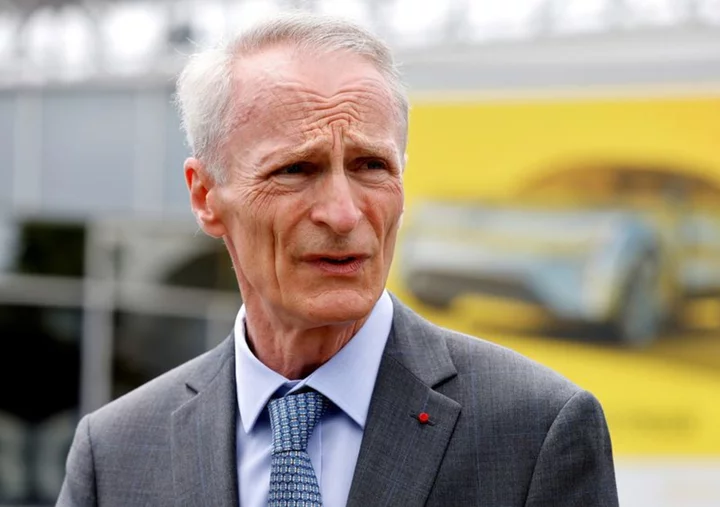By Mathieu Rosemain and Leigh Thomas
AIX-EN-PROVENCE, France European firms are concerned they could get caught in the cross-fire of rising economic rivalry between the United States and China, with some officials at a French business conference also frustrated at Europe's slowness in crafting a response.
Rising trade tensions between the two superpowers are adding to the problems facing politicians and executives as they face a European economy operating at close to standstill, and guessing whether to prepare for a hard or soft landing.
"We're keeping a particularly close eye on the current tensions between the U.S. and China," said Florent Menegaux, chief executive of French tyremaker Michelin.
"Geopolitics obviously has an influence on the way companies operate," Menegaux said, adding Michelin was reviewing the sourcing of some components to avoid being too dependent on China.
The search for other sources of raw materials, or reworking supply chains to cut exposure to China - dubbed "de-risking" in the West - was further fuelled by China's recent restrictions on exports of two key raw materials, gallium and germanium, used in making semiconductors.
"We're paying for the competition between the United States and China," Renault Chairman Jean-Dominique Senard said, in reference to the Chinese curbs, as Europe grapples with what he called a "Chinese storm" looming over the electric vehicle industry.
China's show of force over the supply chain for key metals comes after years of strategic investments and shouldn't come as a surprise, said Christel Bories, chief executive of mining group Eramet.
"They've built monopolies and they use them," Bories said.
"In the (EV) battery value chain, it's not just a question of controlling the chain, but also of controlling costs," Bories said, adding that China was in the midst of building another monopoly over the supply of nickel and cobalt - also key battery components - in Indonesia.
FRUSTRATION OVER IRA
Frustration is also growing among European leaders over the pain that they say could be inflicted by the U.S. Inflation Reduction Act (IRA) on some large industrial groups, whose energy bills are still much higher than in America.
"When we see the impact that the IRA will have (on European companies), I think we haven't talked enough about it at this conference," a senior banker said. "There is a big risk that European companies will shift their investments (from Europe to the United States)."
Some say the main concern is the time taken by European Union authorities to respond.
"With the IRA, there's some stability about what companies should expect" in the United States, Veronika Grimm, one of the German government's chief economic experts who advises the chancellery, told Reuters.
"Meanwhile in Europe, we debate back and forth whether we should have subsidies and whether we should tax superprofits."
Attending the conference, Heather Boushey, a member of the White House Council of Economic Advisers, defended the IRA, saying the United States would stick with its trading partners even if it was rethinking its role in the global trading system.
"I understand the frustration, but when you look at the details of the extent to which the United States is subsidising its domestic industry, it is not greater than what the Europeans do themselves," Boushey said.
The arguments fell on deaf ears among the few Chinese executives attending the conference, noting Europe has become a battlefield not only for Chinese dominance but also for U.S. sway in the tech field.
"Risks don't come from the East only," a senior executive of one Chinese group said on the sidelines of the conference. "They can (come) from the West too."
(Reporting by Mathieu Rosemain; Editing by David Holmes)

